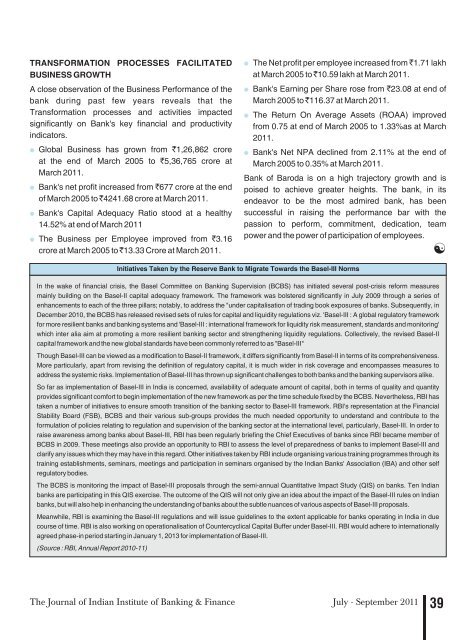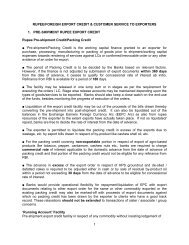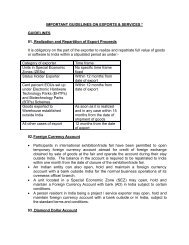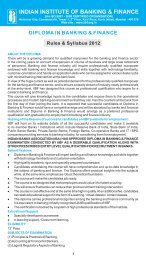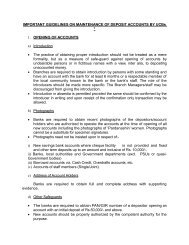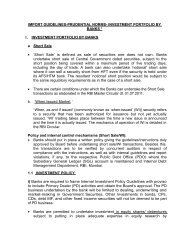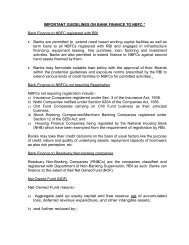Keb[ / DebkeÀ / pegueeF& - efmelebyej /
special feature - Indian Institute of Banking & Finance
special feature - Indian Institute of Banking & Finance
- No tags were found...
You also want an ePaper? Increase the reach of your titles
YUMPU automatically turns print PDFs into web optimized ePapers that Google loves.
TRANSFORMATION PROCESSES FACILITATEDBUSINESS GROWTHA close observation of the Business Performance of thebank during past few years reveals that theTransformation processes and activities impactedsignificantly on Bank's key financial and productivityindicators.Global Business has grown from `1,26,862 croreat the end of March 2005 to `5,36,765 crore atMarch 2011.●Bank's net profit increased from `677 crore at the endof March 2005 to `4241.68 crore at March 2011.●Bank's Capital Adequacy Ratio stood at a healthy14.52% at end of March 2011●The Business per Employee improved from `3.16crore at March 2005 to `13.33 Crore at March 2011.●The Net profit per employee increased from `1.71 lakhat March 2005 to `10.59 lakh at March 2011.●Bank's Earning per Share rose from `23.08 at end ofMarch 2005 to `116.37 at March 2011.●The Return On Average Assets (ROAA) improvedfrom 0.75 at end of March 2005 to 1.33%as at March2011.●Bank's Net NPA declined from 2.11% at the end ofMarch 2005 to 0.35% at March 2011.●special featureBank of Baroda is on a high trajectory growth and ispoised to achieve greater heights. The bank, in itsendeavor to be the most admired bank, has beensuccessful in raising the performance bar with thepassion to perform, commitment, dedication, teampower and the power of participation of employees.In the wake of financial crisis, the Basel Committee on Banking Supervision (BCBS) has initiated several post-crisis reform measuresmainly building on the Basel-II capital adequacy framework. The framework was bolstered significantly in July 2009 through a series ofenhancements to each of the three pillars; notably, to address the "under capitalisation of trading book exposures of banks. Subsequently, inDecember 2010, the BCBS has released revised sets of rules for capital and liquidity regulations viz. 'Basel-III : A global regulatory frameworkfor more resilient banks and banking systems and 'Basel-III : international framework for liquidity risk measurement, standards and monitoring'which inter alia aim at promoting a more resilient banking sector and strengthening liquidity regulations. Collectively, the revised Basel-IIcapital framework and the new global standards have been commonly referred to as "Basel-III"Though Basel-III can be viewed as a modification to Basel-II framework, it differs significantly from Basel-II in terms of its comprehensiveness.More particularly, apart from revising the definition of regulatory capital, it is much wider in risk coverage and encompasses measures toaddress the systemic risks. Implementation of Basel-III has thrown up significant challenges to both banks and the banking supervisors alike.So far as implementation of Basel-III in India is concerned, availability of adequate amount of capital, both in terms of quality and quantityprovides significant comfort to begin implementation of the new framework as per the time schedule fixed by the BCBS. Nevertheless, RBI hastaken a number of initiatives to ensure smooth transition of the banking sector to Basel-III framework. RBI's representation at the FinancialStability Board (FSB), BCBS and their various sub-groups provides the much needed opportunity to understand and contribute to theformulation of policies relating to regulation and supervision of the banking sector at the international level, particularly, Basel-III. In order toraise awareness among banks about Basel-III, RBI has been regularly briefing the Chief Executives of banks since RBI became member ofBCBS in 2009. These meetings also provide an opportunity to RBI to assess the level of preparedness of banks to implement Basel-III andclarify any issues which they may have in this regard. Other initiatives taken by RBI include organising various training programmes through itstraining establishments, seminars, meetings and participation in seminars organised by the Indian Banks' Association (IBA) and other selfregulatory bodies.The BCBS is monitoring the impact of Basel-III proposals through the semi-annual Quantitative Impact Study (QIS) on banks. Ten Indianbanks are participating in this QIS exercise. The outcome of the QIS will not only give an idea about the impact of the Basel-III rules on Indianbanks, but will also help in enhancing the understanding of banks about the subtle nuances of various aspects of Basel-III proposals.Meanwhile, RBI is examining the Basel-III regulations and will issue guidelines to the extent applicable for banks operating in India in duecourse of time. RBI is also working on operationalisation of Countercyclical Capital Buffer under Basel-III. RBI would adhere to internationallyagreed phase-in period starting in January 1, 2013 for implementation of Basel-III.(Source : RBI, Annual Report 2010-11)Initiatives Taken by the Reserve Bank to Migrate Towards the Basel-III NormsThe Journal of Indian Institute of Banking & Finance July - September 2011 39


